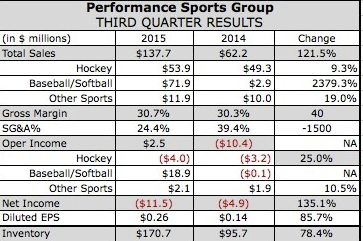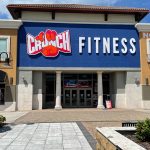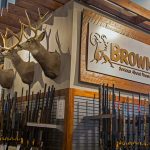 Performance Sports Group Ltd. (PSG) widened its loss for the third quarter ended February 28, but earned a profit against a loss excluding special items with all three of its core segments showing healthy revenue gains.
Performance Sports Group Ltd. (PSG) widened its loss for the third quarter ended February 28, but earned a profit against a loss excluding special items with all three of its core segments showing healthy revenue gains.
The loss in the quarter spread to $11.5 million, or 24 cents a share, from $4.9 million, or 14 cents, a year ago. The steeper loss reflected a foreign currency loss of $13.4 million in the latest period versus a gain of $3.6 million a year ago, as well as acquisition related costs in both periods.
Adjusted net income reached $6.2 million or 13 cents per share, rebounding from a loss of $4.2 million or 11 cents, a year ago. The impact of foreign exchange reduced adjusted net income by approximately 5 cents per share compared to the prior year.
Revenues vaulted 121.5 percent to $137.7 million due to the acquisition of Easton. On a currency-neutral (c-n) basis, revenues were up 127 percent. Excluding Easton, as well as the impact from foreign exchange, revenues grew organically by 16 percent.
On a conference call with analysts, Kevin Davis, president and CEO, said the overall business “continues to perform well “despite currency headwinds that are having a have a significant impact, particularly on its hockey business. For the year-to-date period, foreign currency reduced its adjusted EPS by approximately 17 cents a share.
Hockey revenues (Bauer and Mission Hockey) in the quarter increased 9.3 percent to $53.9 million, driven by the new Vapor 1X stick launch and a 29 percent gain in team apparel, partially offset by the shift in timing of certain orders to earlier this year and an unfavorable impact from foreign exchange. Excluding currency impacts, hockey revenues increased 16 percent. Composite stick sales growth of 92 percent due to the Q3 Vapor launch versus the Q4 launch of the Nexus stick last year. Officials said the 26 percent year-to-date growth is “a more appropriate barometer” of its growth rate in sticks.
Hockey EBITDA was a loss of $4.0 million in the quarter compared to a loss of $3.2 million in the year-ago period. The decrease was due to the impact of foreign exchange. Excluding foreign exchange, Hockey EBITDA increased $2.5 million or 78 percent.
Davis said booking orders for the upcoming hockey season, spanning the fourth and first fiscal quarters, met expectations. He added, “On a currency-neutral basis, these booking orders were roughly equal to the previous back-to-hockey season, driven by strong bookings for the new Vapor line of skates, Supreme underprotective, our new Prodigy line of youth equipment, and our new street hockey category.”
Baseball/Softball revenues (Easton and Combat) in the quarter reached $71.9 million, up from only $2.9 million in the year-ago period due to the addition of Easton. Baseball/Softball EBITDA was $18.9 million against a loss of $0.1 million in the year-ago period.
Davis said Easton has continued its strong performance, growing sales 14 percent year-to-date, with solid performance from the Mako family of products. The quarter also benefited from some of its larger retailers taking in product, particularly the Mako and Mako Torq bats, earlier than last year, a shift that will impact fourth-quarter comparisons. Combat is expected to benefit from the recent launch of its Maxim slow pitch and fast pitch softball bats, and Easton from a new helmet that includes PSG technology with the addition of PORON XRD.
Revenues in the Other Sports segment (Maverik, Cascade Helmets and Inaria) increased 19.0 percent in the quarter to $11.9 million. This was driven by 19 percent growth in lacrosse, including an 11 percent increase from Cascade and growth in every equipment category of the Maverik brand. Cascade benefited from the resumption of helmet shipments following the recertification of the R helmet and all other current models. Maverik continued to see strong demand for its new line of heads and shafts, as well as its new protective equipment and team gloves.
Other Sports EBITDA expanded 10.5 percent to $2.1 million, driven by growth in lacrosse revenues, partially offset by lower gross margins in lacrosse due to higher inventory reserves and lower margins on lacrosse helmets as a result of changes required for the recertification of the Cascade R helmet. The total cost of the R model recertification and corresponding quality audit was estimated to be between $3 million and $4 million.
On a regional basis, companywide revenues in North America grew 147 percent, which was aided by Easton, and increased 15 percent in the rest of the world. The NA region particularly benefited from the Easton baseball business with its international segments much more skewed toward hockey.
Companywide, adjusted gross margin improved 180 basis points to 33.6 percent primarily driven by the addition of Easton, partially offset by the unfavorable impact from foreign exchange. Excluding acquisition-related charges, share-based payment expenses and costs related to a lacrosse helmet decertification, SG&A expenses decreased to 21.0 percent of sales compared to 32.8 percent in the year-ago quarter.
Adjusted EBITDA increased to $14.4 million compared to a loss of $3.0 million in the year-ago quarter. On a constant currency basis, Adjusted EBITDA was $17.5 million.
PSG officials warned that the continued devaluation of the Canadian dollar, Swedish krona and euro versus the U.S. dollar will have a significant impact on its reported revenue growth in upcoming quarters. Approximately 40 percent of its revenue is denominated in these currencies.
Bauer is also the rapid devaluation of the Russian ruble has caused some disruption in the region that is impacting smaller market post-Soviet neighboring countries.
Davis said that while the U.S. dollar strength is presenting a headwind on reported results in the hockey business in future quarters, “every part of our business is showing strength and we continue to gain market share across all of our sports. We remain on track to deliver another year of record currency-neutral top- and bottom-line performance in FY15.”















